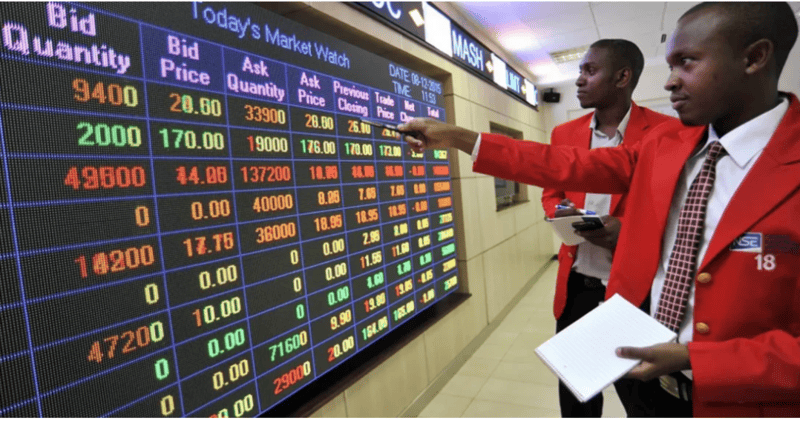Explainer: NSE scraps minimum 100 shares trading rule- what this means for Kenyans

In other terms, it means retail investors can now buy just one share of blue-chip stocks like Stanchart Kenya (Sh309 per share), Kakuzi (Sh439 per share) or EABL (Sh224 per share).
Effective August 8, the Nairobi Securities Exchange (NSE) will allow the public to invest at the bourse by purchasing a single share of any listed company, doing away with the previous minimum 100‑share requirement.
In other terms, it means retail investors can now buy just one share of blue-chip stocks like Stanchart Kenya (Sh309 per share), Kakuzi (Sh439 per share) or EABL (Sh224 per share).
More To Read
- NSE enforces strict shareholding regulations as Kenya’s capital markets soar 15 per cent
- Kenya’s stock market reaches major milestone with single-share trading
- Kenya's economy grows 5 per cent in second quarter of 2025- KNBS
- MPs question proposed sale of East African Portland Cement shares to Tanzanian firm
- High Court blocks government sale of Kenya Pipeline shares
- President Ruto responds to Maraga over ‘failed state’ remarks, defends government record
Previously, investors had to buy shares in board lots, which are standardised units of 100 shares each.
This meant even buying a small position in high-priced companies like the aforementioned Standard Chartered, Kakuzi, or EABL carried a hefty minimum cost.
For example, a single board lot in a Sh300‑plus stock required over Sh30,000, arguably pricing out many retail and low-income investors.
Those who could only afford fewer than 100 shares had to use the Odd Lot Board, a separate trading platform where liquidity was thinner and price spreads were often wider.
Reportedly, trades done on Odd Lot were less efficient, and transactions could take longer to execute.
Additionally, closing prices reported from those odd-lot trades did not count unless total volume reached 100 units, resulting in reliance on previous session averages, hampering accurate price discovery and fair market valuation.
Ideally, it meant that when fewer than 100 shares were traded in a day, the NSE did not update the official closing price and instead carried over the previous day’s average price.
This resulted in tiny trades on the board and had no influence on the reported price, making the official price often stale compared to actual trading sentiment.
To this effect, the Odd Lot Board has also been abolished, meaning all market orders will now be placed and executed on the Main Order Book.
However, the official closing price will only change if 100 or more units trade in a session.
According to the bourse, the move to allow single-unit trading significantly lowers the barrier to entry, giving investors fairer pricing and better access.
The change follows the approval of amendments to the NSE Equity Trading Rules, allowing the buying and selling of shares in single units.
Commenting on the development, NSE Chief Executive Officer Frank Mwiti said the move is in line with the country’s financial inclusion goals.
“We are pleased to take this significant step towards enhancing retail investor participation in our market. This initiative is part of our broader strategic efforts to increase financial inclusion and market accessibility for all investors,” Mwiti said.
He added that the move aligns with the bourse’s vision of increasing the number of active investors to nine million by 2029.
Top Stories Today














































